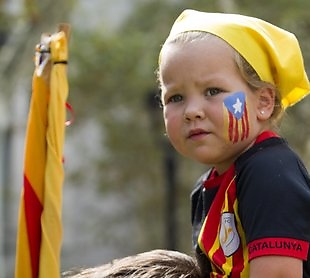Politics and responsibility: A complex relation
On September 11th the whole world witnessed a huge rally in Barcelona’s streets in favour of the Catalan independence. This has been the 4th consecutive year with great pacific mobilizations from the Catalan civil population claiming for the chance to vote about their own independence. But, what’s the reaction of the politicians? What should they do?
First of all, a definition of who are the politicians can help us to know what their responsibility is. The politicians are some men and woman who are chosen every few years to be the people’s voice on the parliament according to the principles of their own electoral programs. Additionally, when one party is on the government, it has the responsibility of doing what is better for its county and the responsibility to make sure that all their citizens enjoy the society’s fundamental rights.
Watching at these two main responsibilities, a natural question appears. Do they always work in the same direction? It is possible that a government need to forget about their own population fundamental rights in order to do what is better for them or vice versa?
This is exactly what happens in the “Catalan affair”. The Spanish government has a huge dilemma because, in one hand, if they allowed Catalans to vote and get independent, Spain would become way poor. On the other hand, deny the Catalans their right to decide about their own collective future is a serious attack to the democratic values. What they finally did was to block any intent of negotiation from the Catalan government and argue that any referendum or consultation about secession was unconstitutional.
And what happens in Catalonia? Before the blooming of the sovereignty, only a few Catalan parties were in favour or against the independence because it was an utopic debate. Nevertheless, after the first huge rally in 2011 people started to realize that the independence supporters were not a minority. Three decades of frustrated negotiations to be a singular community in Spain, due to a different culture and language, finished in a massive refuse to Spain. In that context, the majority of Catalan parties started different democratic procedures to ask their affiliates if they were in favour or against independence and included the support or refuse to the independence in their own electoral programs.
Watching at that political serial, that still has to be solved, we can point two observations. First of all, there is a strange situation about responsibility where a few (politicians) have the responsibility for the many (citizens). Secondly, we can learn that responsibility is an ethical obligation but, sometimes, you have to forget it in order to do what is correct according to our modern society values. In that case, the Spanish government have the responsibility of doing what is better for their country, keeping Catalonia inside Spain, but also have the stronger responsibility of allowing people to vote, one of the pillars of occidental society.
The writer’s personal opinion is that Spanish government should allow Catalan people to vote but, of course, support the non independentist option. If the reader wants more information about the “Catalan affair”, in 27th September the Catalan government will celebrate plebiscitary elections where all parties have pronounced in favour or against independence. The result is uncertain since the undecided people weights around 15% of the votes.
Jordi Granés Puig
Delft, 13th September 2015
